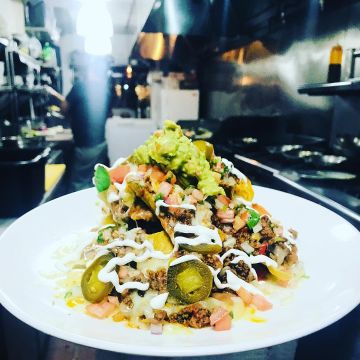Is Mexican Food Healthy And Balanced? Unboxing the Nutritional Conveniences of Typical Active Ingredients
The inquiry of whether Mexican food is healthy and balanced invites an expedition of its conventional ingredients. Beans and corn function as fundamental staples, rich in healthy protein and fiber. Avocados offer beneficial fats, while various natural herbs and spices include flavor and health advantages - tacos. With each other, these components create a tapestry of nutrition. The healthiness of Mexican food commonly depends on preparation methods and section dimensions. What function do these variables play in identifying its general dietary value?
The Power of Beans: Protein and Fiber-Rich Staples
Although often forgotten, beans function as a foundation of Mexican cuisine, offering a riches of nutritional benefits. Rich in healthy protein, they are an exceptional plant-based alternative for those looking for to meet their nutritional protein requires. This high protein material sustains muscle mass repair and growth, making beans very useful for both meat-eaters and vegetarians alike. Furthermore, beans are an extraordinary resource of dietary fiber, which aids in digestion and promotes a feeling of fullness, possibly assisting with weight management.
The range of beans utilized in Mexican meals, such as black beans, pinto beans, and kidney beans, adds to a varied taste account and can enhance meals nutritionally. Beans are reduced in fat and have vital vitamins and minerals, consisting of iron, magnesium, and folate. With each other, these attributes make beans an important ingredient, providing both nutrients and food in standard Mexican price.

Corn: a Versatile Grain With Nutritional Benefits
Corn attracts attention as a functional grain essential to Mexican cuisine, celebrated not just for its culinary applications but additionally for its outstanding dietary profile. As a key component in recipes like tortillas, tamales, and pozole, corn supplies essential nutrients that add to a well balanced diet regimen. Rich in carbs, it serves as a considerable energy resource, while additionally being reduced in fat, making it a desirable option for various nutritional demands.
Corn is a great source of dietary fiber, which helps in food digestion and advertises satiation. It contains substantial quantities of vitamins such as B-complex vitamins, which are important for basal metabolism. The existence of anti-oxidants, particularly carotenoids, adds to total wellness by reducing oxidative anxiety. In addition, corn is gluten-free, satisfying those with gluten level of sensitivities. In general, the dietary benefits of corn underscore its relevance in typical Mexican food and its function in a healthy and balanced diet.
Avocados: Healthy Fats and Nutrients in Every Bite
Avocados play a considerable role in Mexican food, enhancing recipes with their luscious structure and rich taste. Past their culinary appeal, avocados are celebrated for their excellent nutritional account. They are an abundant source of healthy monounsaturated fats, which can help reduced negative cholesterol degrees and assistance heart health. In addition, avocados are loaded with essential nutrients, consisting of potassium, vitamin E, and B vitamins, adding to general wellness.
The high fiber content in avocados aids food digestion and promotes satiety, making them a useful enhancement to any type of meal. Their unique nutrient make-up can additionally sustain skin health and wellness and give anti-inflammatory benefits. Integrating avocados into traditional Mexican meals or appreciating them as a standalone treat can enhance both taste and nourishment, demonstrating why they are a beloved staple in Mexican food. Overall, avocados use a scrumptious means to enjoy healthy and balanced fats and essential nutrients in every bite.
Herbs and seasonings: Flavorful Wellness Boosters
While enjoying the abundant tastes of Mexican cuisine, one can not overlook the crucial duty that spices and herbs play in boosting both taste and health. Active ingredients such as cilantro, chili, and oregano peppers not only add to the vivid taste profile however likewise offer considerable health advantages. Cilantro is known for its cleansing buildings, aiding to eliminate heavy steels from the body, while oregano is loaded with anti-oxidants and has anti-inflammatory effects.
Chili peppers, a staple in several Mexican dishes, have capsaicin, which has been linked to boosted metabolic process and discomfort alleviation. In addition, flavors like cumin and coriander assistance digestion and might help in blood sugar level guideline. Incorporating these flavorful wellness boosters right into meals not just enhances the cooking experience however additionally advertises general wellness, making Mexican food not just tasty, yet also nutritionally beneficial.
Standard Food Preparation Approaches: Enhancing Nutrition and Flavor
Conventional food preparation techniques in Mexican cuisine play a crucial function in improving both nutrition and taste, as they typically focus on classic techniques and fresh components. Techniques such as nixtamalization, where corn is saturated and white castle near me prepared in an alkaline option, not only improve the nutrient account of tortillas however additionally improve their digestibility - take out and delivery. In her latest blog addition, using sluggish food preparation techniques, like cooking or braising, allows tastes to meld perfectly while keeping the stability of the components

Regularly Asked Concerns
Are Mexican Food Portions Typically Larger Than Various Other Cuisines?
Mexican food sections are frequently larger than those of numerous various other foods. This characteristic mirrors typical eating methods, emphasizing communal sharing and hearty meals, which can result in an extra considerable offering size on the whole.
Exactly how Does the Preparation Technique Affect Healthiness of Mexican Food?
Prep work methods greatly influence the healthiness of Mexican food. Techniques such as barbecuing or steaming maintain nutrients, while frying can enhance undesirable fat content. Options of components and cooking styles eventually establish total nutritional worth.
Can Mexican Food Be Tailored for Specific Dietary Limitations?
Mexican food can certainly be customized for particular nutritional constraints. Substitutions, such as utilizing corn tortillas for gluten-free diets or incorporating more veggies, enable individuals to appreciate standard flavors while fitting various dietary needs.
What Prevail Misunderstandings Regarding Mexican Food and Wellness?
Typical false impressions concerning Mexican food consist of the idea that it is inherently undesirable, extremely spicy, and solely focused on fats. In fact, traditional meals frequently include nourishing ingredients and can be customized to various nutritional needs.
Exist Much Healthier Alternatives at Mexican Restaurants?
Much healthier choices at Mexican restaurants commonly include smoked meats, beans, and fresh veggies. Selecting dishes that highlight entire components and staying clear of heavy sauces can result in a more nourishing dining experience, promoting overall well-being.
The selection of beans made use of in Mexican meals, such as black beans, pinto beans, and kidney beans, adds to a varied flavor profile and can enhance meals nutritionally. Avocados play a significant role in Mexican cuisine, matching dishes with their luscious appearance and rich flavor. Integrating avocados into traditional Mexican meals or enjoying them as a standalone snack can improve both flavor and nourishment, showing why not find out more why they are a beloved staple in Mexican cuisine. While delighting in the abundant flavors of Mexican cuisine, one can not ignore the crucial function that spices and natural herbs play in enhancing both preference and health. Conventional cooking techniques in Mexican food play a vital function in boosting both nutrition and flavor, as they typically prioritize fresh components and time-honored techniques.